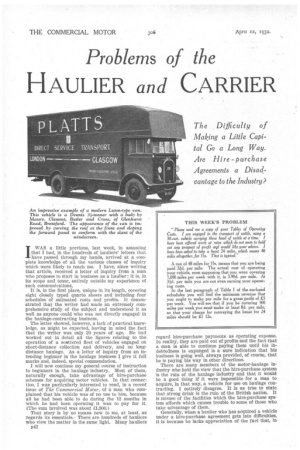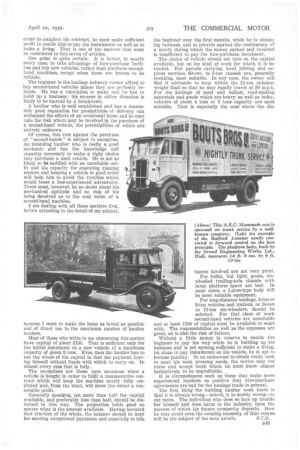Problems of the
Page 60

Page 61

If you've noticed an error in this article please click here to report it so we can fix it.
HAULIER and CARRIER
The Difficulty of Making a Little Capital Go a Long Way. Are Hire-purchase Agreements a Disadvantage to the Industry?
IWAS a little previous, last week, in assuming that I had, in the hundreds of hauliers' letters that have passed through ray hands, arrived at a complete knowledge of all the various classes of inquiry which were likely to reach me. I have, since writing that article, received a letter of inquiry from a man who proposes to start in business as a haulier: it is, in its scope and tenor, entirely outside my experience of such communications It is, in the first place, unique in its length, covering eight closely typed quarto sheets and including four schedules of estimated costs and profits. It demonstrated that the writer had made an extremely .comprehensive study of the subject and understood it as well as anyone could who was not directly engaged in the haulage-contracting business.
The letter showed, however, a lack of practical knowledge, as might be expected, having in mind the fact that the writer was only 20 years of age. He had worked out in detail all the figures relating to the operation of a scattered fleet of vehicles engaged on short-distance collection and delivery, and on longdistance haulage. As a letter of inquiry from an intending beginner in the haulage business I give it full marks and, indeed, special commendation.
I will now continue my general course of instruction to beginners in the haulage industry. Most of them, naturally enough, take advantage of hire-purchase schemes for acquiring motor vehicles. In that connection, I was particularly interested to read, in a recent issue of The Commercial Motor, of a man who complained that his vehicle was of no use to him, because all lie had been able to do during the 12 months in which he had been operating it was to pay for it. (The sum involved was about L1,300.)
That story is by no means new to me, at least, as regards its essentials. There are hundreds of hauliers who view the matter in the same light. Many hauliers 3342 regard hire-purchase payments as operating expense. In reality, they are paid out of profits and the fact that a man is able to continue paying them until his indebtedness is expunged is a sure indication that his business is going well, always provided, of course, that he is paying his way in other directions. There are many members of the motor-haulage industry who hold the view that the hire-purchase system is the ruin of the haulage industry and that it would be a good thing if it were impossible for a man to acquire, in that way, a vehicle for use on haulage contracting. I entirely disagree. It is as true to state that strong drink is the ruin of the British nation. It is misuse of the facilities which the hire-purchase system affords which causes trouble to some of those who take advantage of them. Generally, when a haulier who has acquired a vehicle under a hire-purchase agreement gets into difficulties, it is because he lacks appreciation of the fact that, in order to complete his contract, he must make sufficient profit to enable him to pay the instalments as well as to make a living. That is one of the matters that must be considered in this series of articles.
One point is quite certain. It is better, in nearly every case, to take advantage of hire-purchase facilities and buy new vehicles, rather than purchase secondhand machines, except when these are known to be reliable.
The beginner in the haulage industry cannot afford to buy second-hand vehicles unless they are per fetAly reliable. He has a reputation to make and he has to build up a business ; his success in either direction is likely to be marred by a breakdown.
A haulier who is well established and has a reasonably good reputation for pronliptitude. of delivery can withstand the effects of an occasional lapse and he may take the risk which may be involved in the purchase of a second-hand vehicle, the potentialities of which are entirely unknown.
Of course, this rule against the purchase of " second-hands " is subject to exception. An intending haulier who is really a good mechanic and has the knowledge and capacity necessary to make a right choice may purchase a used vehicle. He is not so likely to be saddled with an unreliable outfit and his capacity for executing running repairs and keeping a vehicle in good order will help him to avoid the troubles which would beset a less-experienced adventurer. There must, however, be no doubt about his mechanical aptitude and no risk of his being deceived as to the real value of a second-hand machine.
I am dealing with all these matters first, before attending to the detail of my subject,
because I want to make the issue as broad as possible and of direct use to the maximum number of haulier readers,
Most of those who write to me concerning this matter have capital of about £150. That is sufficient only for the initial instalment on a new vehicle of a maximum capacity of about 3 tons. Even then the haulier has to use the whole of his capital in that one payment, leaving himself without funds with which to carry on. In almost every case that is folly.
The exceptions are those rare occasions when a vehicle is bought in order to fulfil a remunerative contract which will keep the machine nearly fully employed and, from the start, will show the owner a reasonable profit.
Generally speaking, not more than half the capital available, and preferably less than half, should be disbursed in this way. The proportion holds good no matter what is the amount available. Having invested that fraction of the whole, the balance should be kept for meeting exceptional payments and especially to tide the beginner over the first months, while he is obtaining business, and to provide against the contingency of a month during which the money earned and received is insufficient to pay the hire-purchase instalment.
The choice of vehicle should not turn on the capital available, but on the kind of work for which it is intended. For parcels carrying, local jobbing and express services 30-cwt. to 2-ton chassis are, generally speaking, most suitable. In any case, the owner will find it advisable to keep within the 21-ton unladenweight limit so that he may legally travel at 30 m.p.h. For the .haulage of sand and ballast, road-making materials and goods which are heavy as well as bulky, vehicles of about 4 tons or 5 tons, capacity are most suitable. That is especially the ease where the dis Lances involved are not very great.
For bulky, but light, goods, sixwheeled trailing-axle chassis with large platform space are best. In most cases, a Luton-type body will be most suitable equipment.
For long-distance haulage, 6-ton or 8-ton vehicles and trailers, or 10-ton to 12-ton six-wheelers, should he selected. For that class of work second-hand vehicles are unsuitable and at least £500 of capital must be available to start with. The responsibilities as well as the expenses are great, as is also the risk of failure. Without a little money in reserve to enable the beginner to pay his way while he is building up his business and is not earning sufficient to make a living, let alone to pay instalments on his vehicle, he is apt to become panicky. In an endeavour to obtain ready cash to meet his most pressing• needs, the novice may cut rates and accept work which he must know almost instinctively to be unprofitable. It is circumstances such as these that make more experienced hauliers so positive that hire-purchase agreements are bad for the haulage trade in general. The first thing the budding haulier must learn is that it is always wrong—indeed, it is doubly wrong—to cut rates. The individual who does so lays up trouble for himself and does harm to the industry, upon the success of which his future prosperity depends. How he may avoid even the seeming necessity of that course will be the subject of the next article.




































































































